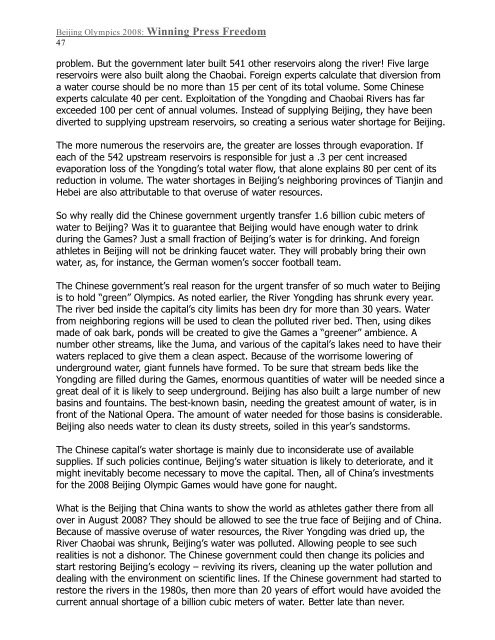Beijing Olympics 2008: Winning Press Freedom - World Press ...
Beijing Olympics 2008: Winning Press Freedom - World Press ...
Beijing Olympics 2008: Winning Press Freedom - World Press ...
You also want an ePaper? Increase the reach of your titles
YUMPU automatically turns print PDFs into web optimized ePapers that Google loves.
<strong>Beijing</strong> <strong>Olympics</strong> <strong>2008</strong>: <strong>Winning</strong> <strong>Press</strong> <strong>Freedom</strong><br />
47<br />
problem. But the government later built 541 other reservoirs along the river! Five large<br />
reservoirs were also built along the Chaobai. Foreign experts calculate that diversion from<br />
a water course should be no more than 15 per cent of its total volume. Some Chinese<br />
experts calculate 40 per cent. Exploitation of the Yongding and Chaobai Rivers has far<br />
exceeded 100 per cent of annual volumes. Instead of supplying <strong>Beijing</strong>, they have been<br />
diverted to supplying upstream reservoirs, so creating a serious water shortage for <strong>Beijing</strong>.<br />
The more numerous the reservoirs are, the greater are losses through evaporation. If<br />
each of the 542 upstream reservoirs is responsible for just a .3 per cent increased<br />
evaporation loss of the Yongding’s total water flow, that alone explains 80 per cent of its<br />
reduction in volume. The water shortages in <strong>Beijing</strong>’s neighboring provinces of Tianjin and<br />
Hebei are also attributable to that overuse of water resources.<br />
So why really did the Chinese government urgently transfer 1.6 billion cubic meters of<br />
water to <strong>Beijing</strong>? Was it to guarantee that <strong>Beijing</strong> would have enough water to drink<br />
during the Games? Just a small fraction of <strong>Beijing</strong>’s water is for drinking. And foreign<br />
athletes in <strong>Beijing</strong> will not be drinking faucet water. They will probably bring their own<br />
water, as, for instance, the German women’s soccer football team.<br />
The Chinese government’s real reason for the urgent transfer of so much water to <strong>Beijing</strong><br />
is to hold “green” <strong>Olympics</strong>. As noted earlier, the River Yongding has shrunk every year.<br />
The river bed inside the capital’s city limits has been dry for more than 30 years. Water<br />
from neighboring regions will be used to clean the polluted river bed. Then, using dikes<br />
made of oak bark, ponds will be created to give the Games a “greener” ambience. A<br />
number other streams, like the Juma, and various of the capital’s lakes need to have their<br />
waters replaced to give them a clean aspect. Because of the worrisome lowering of<br />
underground water, giant funnels have formed. To be sure that stream beds like the<br />
Yongding are filled during the Games, enormous quantities of water will be needed since a<br />
great deal of it is likely to seep underground. <strong>Beijing</strong> has also built a large number of new<br />
basins and fountains. The best-known basin, needing the greatest amount of water, is in<br />
front of the National Opera. The amount of water needed for those basins is considerable.<br />
<strong>Beijing</strong> also needs water to clean its dusty streets, soiled in this year’s sandstorms.<br />
The Chinese capital’s water shortage is mainly due to inconsiderate use of available<br />
supplies. If such policies continue, <strong>Beijing</strong>’s water situation is likely to deteriorate, and it<br />
might inevitably become necessary to move the capital. Then, all of China’s investments<br />
for the <strong>2008</strong> <strong>Beijing</strong> Olympic Games would have gone for naught.<br />
What is the <strong>Beijing</strong> that China wants to show the world as athletes gather there from all<br />
over in August <strong>2008</strong>? They should be allowed to see the true face of <strong>Beijing</strong> and of China.<br />
Because of massive overuse of water resources, the River Yongding was dried up, the<br />
River Chaobai was shrunk, <strong>Beijing</strong>’s water was polluted. Allowing people to see such<br />
realities is not a dishonor. The Chinese government could then change its policies and<br />
start restoring <strong>Beijing</strong>’s ecology – reviving its rivers, cleaning up the water pollution and<br />
dealing with the environment on scientific lines. If the Chinese government had started to<br />
restore the rivers in the 1980s, then more than 20 years of effort would have avoided the<br />
current annual shortage of a billion cubic meters of water. Better late than never.





